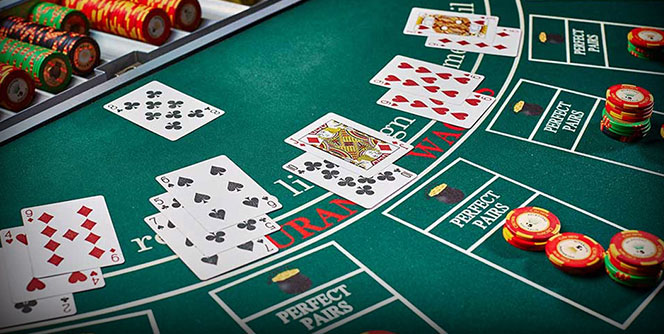New Jersey is a state with a long history of being more permissive of gambling activities than most regions of the
country, besides Nevada. Before they were outlawed in 1844, the local government used lotteries to fund the military
during two wars – the French and Indian War and the American Revolution – as well as the college campuses that would
eventually become Princeton and Rutgers Universities.
Additionally, New Jersey boasts the oldest racetrack in the US. Freehold Raceway was hosting horse races as far back
as the 1830s. Eventually, the state went through a series of legislative changes that resulted in the prohibition of
gambling – with a ban on all commercial gambling activities passed in 1897.
Gambling Begins to Grow in NJ
However, these new rules did nothing to end the legacy of gaming in New Jersey. Instead, the industry went
underground and continued to grow as a significant income stream for organized crime. Enforcement of the state’s
anti-gambling laws was minimal.
The ban on gaming was lifted in 1939, when New Jersey residents voted to legalize betting at racetracks once
again. From there, more activities gradually became legalized:
| Year |
Advancement in the Gaming Industry |
| 1953 |
Bingo and raffles are approved. |
| 1970 |
New Jersey residents are the first in the US to vote for a state
lottery. 81.5% of the voters are in favor of the lottery. |
| 1974 |
Residents of the state vote against legalizing casinos throughout the state. |
| 1975 |
Pick-It, the first legal lottery game that allowed players to choose their own numbers is established. |
| 1976 |
New Jersey votes to legalize casinos, while restricting them to Atlantic City exclusively, making them
the second state in the United States with legal casino gambling. |
Atlantic City
Atlantic City saw its first casino open in 1978, and for the next few decades, saw the city explode in terms of
growth and tourism. For a period, the New Jersey city owned a monopoly on legal casino gambling on the East
Coast. It wasn’t long before there were sixteen casinos in operation in the booming resort town.
However, gaming continued to spread throughout the country, with more and more states either legalizing gambling
or allowing casinos on Native American reservations. The added competition chipped away at AC’s advantage,
costing the city millions per year. With the gambling bubble bursting, the coastal town went into decline.
Nevertheless, the bill was vetoed by Governor Chris Christie for being too open to interpretation
– his fear being that nightclubs, bars, and other establishments would merely set up computer terminals,
“becoming gambling hubs around the state.”
Governor Christie Signs the Internet Gambling Bill
While Governor Christie may have vetoed the bill that would have made New Jersey the first state in the nation to
legalize gambling, he didn’t close the door on the topic altogether. Quite the contrary, Christie just wanted
additional regulations added to the legislation, banning the advertising of online gambling outside of Atlantic
City.
However, if legalizing online gambling was going to, in effect, make gaming available statewide, the Governor
wanted to put it to a vote. He wrote:
“Any effort to expand casino gambling outside of Atlantic City must be supported by referendum and, if the
Legislature believes that expanding gambling outside of Atlantic City is in the best interests of the State of
New Jersey, it should place the question of the ballot for the voters to decide.”
Senator Lesniak began working on new legislation in 2012. At first, two bills were introduced: Senate Bill S1565,
and Assembly Bill A2578. The Assembly bill went on to be passed by the New Jersey legislature
for their second
attempt to legalize online gambling.
Almost There
After the bill passed through the legislature, there were still some adjustments Governor Christie wanted to
make. He conditionally vetoed the measure, but with the promise that, in the end, he’d sign off, passing it into
law.
These minor changes included raising the tax rate on operators’ revenue from 10% to 15%, toughen regulatory
oversight of casino employees, and dedicate additional funds to preventing gambling addiction.
Lesniak, the primary sponsor of the bill, went about working on the changes with local legislators, saying, “This
will give a big boost to Atlantic City, which has been bleeding revenues for the last few years, and will really
give a lifeline and save thousands of jobs.”
The amendments were added to the bill and passed by the New Jersey Legislature one last time. Finally, Governor
Christie signed the online gambling bill into law on February 26, 2013. New Jersey became only the third
state
in the US to legalize internet gaming.
Life After Legalization
Since 2013, online gambling has become a significant source of income for the state. As of 2017, — only four
years after legalization – New Jersey has generated over $100 million in tax revenue.
Best of all, the money earned through internet-based gaming is serving its intended purpose. The substantial
profits have been going towards paying down Atlantic City’s hundreds of millions of dollars of debt.
(2016) New Jersey Casino Expansion Amendment
In 2016, a constitutional amendment was proposed that would allow casino gambling outside of Atlantic City.
According to Fitch, a credit-rating agency, the new legislation would be devastating for AC. They predicted that
allowing new casinos to be built throughout the state would result in at least four of the city’s eight casinos
being bankrupted.
Proponents of the expansion argued that the new gaming establishments would generate an additional $200 million
in tax revenue that would be redirected to Atlantic City. The amendment came to a vote in November 2016 and was
soundly defeated, with over 77% of voters choosing “no.”
Online Gambling in New Jersey
Today, online casino gambling is the most vital form of gaming operating in New Jersey. At the end of 2018, the
state’s licensed internet casinos enjoyed their most dramatic growth since legalization in 2013, increasing
annual revenues by $56 million, taking the total to $277.3 million for the year.







